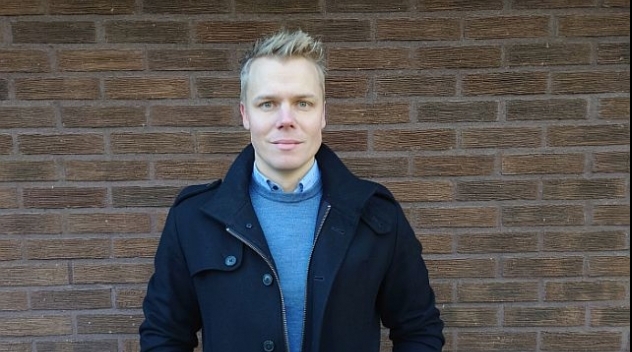This year’s Little Polhem Prize to Uppsala alumnus
The 2020 Little Polhem Prize has been awarded to Uppsala alumnus Richard Hedlund for his degree project on a drone-based detection system for avalanche beacons. “It feels great and it’s a great honour to win this prize. Especially as it is also technology that can be used to save human lives.”
The degree project awarded by the Swedish Association of Graduate Engineers is about an avalanche beacon detector in the form of an advanced radio receiver mounted on an unmanned aerial vehicle (UAV or drone). The detector can pick up signals from avalanche beacons buried in snow to help rescue people trapped by an avalanche.
Richard Hedlund wrote the degree project as part of his Master Programme in Engineering Physics at Uppsala University in 2019.
“Many parts of the programme were included in the degree project, which was especially fun. In particular, the electronics in the form of the radio receiver, but also software development and programming. I spent most of my time on the signal processing.”
Life-saving technology
The idea for the drone-based detection system came from ÅF Digital Solutions in Uppsala, where Richard Hedlund worked as a consultant during his studies. As a Master of Science in Engineering student specialising in embedded systems, the description of this degree project suited him perfectly.
antennas, two software-defined
radios (here analog to digital
converters), two coax cables,
two USB cables and a single-card
computer of the brand Odroid.
Photo: Private
“Besides the fact that it was a larger embedded system to be developed, I thought the application sounded exciting. It's great if you can use technology in a good way that can ultimately save human lives. It's totally the right way to use technology today.”
Richard Hedlund’s task was to design and equip the radio receiver including its technical components, software and digital signal processing.
“The programming and making the software work with all of the hardware in the radio receiver in particular was one of the most enjoyable parts of the work. It takes quite a few steps to make the information in the analogue signal in the air to pass through the entire radio receiver and on to the drone’s computer. It was a fun challenge.”
Support from ÅF
A big support during his degree project was his subject reader for engineering physics, Mikael Sternard, along with his supervisor at ÅF, Johan Tenstam. Other important sounding boards were ‘a bunch of radio gurus’: Tomas Gustafsson, Eskil Bendz, Daniel Brogren and Karl-Arne Markström at ÅF's Solna offices.
In the project he got as far as developing a prototype, but according to Richard, certain parts would need to be improved before it can become a complete solution, and it is unknown whether ÅF has taken this work forward. Today he works as an Embedded Software Engineer at the company CrossControl AB in Bollnäs.
“We develop robust display computers that are used in forestry and agricultural machinery or in the mining and maritime industries. It’s about developing software and applications for these machines, including our own Linux distribution, drivers and other code for microcontrollers.”
With the award of Sweden’s best degree project from the Swedish Association of Graduate Engineers comes a prize of SEK 50,000. The award statement points to the project’s excellent balance between theory and practice and its excellent application of modern technology.
Relaxing holiday for the prize money
He hasn’t quite decided yet what he is going to do with the prize money, but it will at least fund a relaxing weekend away with his partner.
“It’s needed, it’s been very intense for a number of years. When I was writing up the degree project, I had a three-four month old little girl at home. It was a special situation, but then my partner was a great support, which I am very grateful for.”
He does not have any particular dreams for the future. His current career is the one he was aiming towards at the end of his degree.
“I am very satisfied with what I’m doing today. My job is lots of fun and challenging. But maybe I might start my own company one day, if I get a good idea.”
Anneli Björkman
The Little Polhem Prize
The Little Polhem Prize is awarded each year by the Swedish Association of Graduate Engineers for the best degree project in a Master of Science in Engineering programme. The aim is to stimulate the quality of degree projects in these programmes. The projects received are assessed based on their engineering and science achievement, but also on the presentation of the work. Creativity, integration of knowledge, usability and layout are some of the criteria.
This year’s award will be presented by the Swedish Association of Graduate Engineers at a digital event on 11 November, together with the main Polhem Award.

